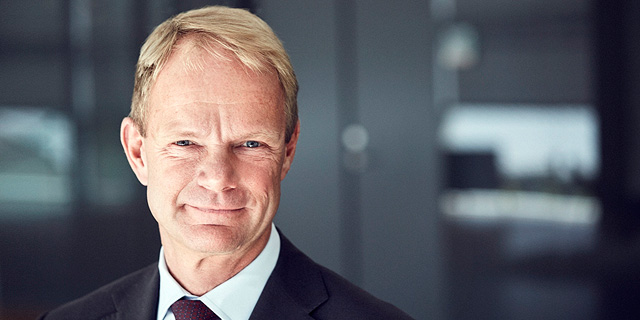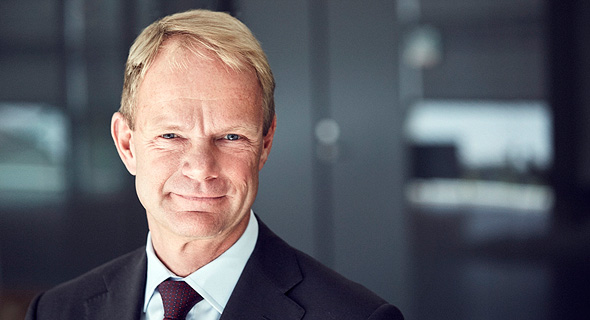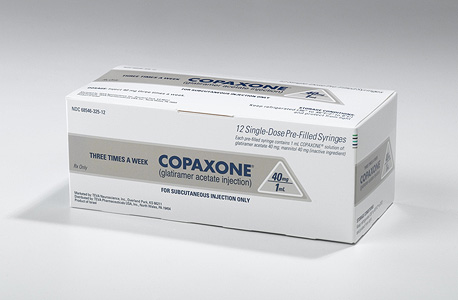
New CEO to Break Teva’s Copaxone Habit
Troubled drugmaker says new CEO must work to quickly regain its financial credibility
More by CTech
Mr. Schultz has served as the president and CEO of Copenhagen-based pharmaceutical company H. Lundbeck A/S since 2015. Before Joining Lundbeck, he was the president and chief operating officer of Bagsværd, Denmark-based pharma company Novo Nordisk.
"He is an expert on turn-around, which will allow him to lead a company in crisis,” said Teva’s Chairman Sol Barer in an interview with Calcalist Monday. “Many CEOs can succeed in a thriving company, but only a few CEOs can successfully lead a company facing financial challenges, as he did for Lundbeck, and give value to the shareholders,” Mr. Barer added. “Teva is a large company and serving many patients, and he will have to quickly present a strategy and operative plan with milestones so we can measure our successes and regain credibility in the financial markets,” Mr. Barer said.Founded in 1901 in Jerusalem, Teva is one of the biggest generic drugmakers in the world. Often associated with Israel’s economic success and the country’s prowess as a technology and innovation hub, the company led the Tel-Aviv Stock Exchange in terms of market capitalization for years.
Teva’s Copaxone Habit
"Winning the lottery" is how Teva employees refer to the Copaxone. The drug was a scientific breakthrough that changed the lives of multiple sclerosis patients and was also the company's main moneymaker for the past two decades. Copaxone catapulted Teva to the top of the global Pharma industry, but 20 years and $40 billion later almost everyone regards the drug as a huge missed opportunity. "Teva had all the money in the world, but it made too many wrong decisions over the years," a former senior executive at Teva told Calcalist. This is how Teva arrived at its current point; its stock price is worth less than it did ten years ago, encapsulating a wasted decade. The company's 2016 revenues reached $21.9 billion, close to its yearly revenues five years ago. The company also let 5,000 thousand employees go this year; though it still employs almost 60 thousand people, concerns about the future abound among its remaining employees, and veteran workers claim this is the worst period they can remember in Teva’s history. The Copaxone still generates a fourth of Teva's revenue and half of its profit, but other pharmaceutical companies, chief among them Mylan N.V., are currently undergoing FDA approval for the generic version of Teva's star drug. The Man Who Turned Teva into an Empire Eli Hurvitz was the man who turned Teva into a generic empire, and the man who brought it Copaxone. In 1980, four years after he became Teva's CEO, Mr. Hurvitz met an old friend, immunologist Michael Sela. Together with biochemist Ruth Arnon and immunologist Dvora Teitelbaum, Mr. Sela found a molecule that reduced the frequency of multiple sclerosis relapses. They started clinical trials but needed more money to continue research. Mr. Hurvitz decided to bet on their research, investing almost $100 million, while knowing very well that if the drug didn't pan out the company might just end up going under. Copaxone was approved by the U.S. Food and Drugs Authority in 1996, setting three precedents: the first multiple sclerosis drug, the first FDA approved drug developed in Israel, and Teva's first brand-name drug. At the time Teva forecasted annual revenue of $300 million, but the existence of Copaxone increased awareness of multiple sclerosis, and the market increased accordingly. Since 2005, Copaxone generated more than $1 billion in annual sales; in 2012 Copaxone's annual sales stabilized around $4 billion. With $40 billion in sales, Teva had a lot of cash on hand. Mr. Hurvitz focused mainly on generic drugs, carrying out several acquisitions of generic drug companies throughout the years, for example, the Canadian Novopharm in 1999. These acquisitions generated good revenues for Teva, driving the company’s stock price up and attracting investors. His successors followed his strategy with ever bolder, more expensive acquisitions. Over the years Teva invested tens of billions of dollars in buying companies and operations intended to assure the company’s long-term growth. The $20 billion Teva invested in acquisitions turned $8.5 billion in revenues in 2006 to $21 billion in revenues in 2016; in other words, Teva paid nearly $2 for every dollar of revenue. Teva acquired the Miami-based pharma company IVAX Corporation in 2006 for $7.4 billion. In 2007 Mr. Hurvitz appointed Shlomo Yanai as CEO and asked him to prepare a strategic plan for Teva post-Copaxone. In actuality, he was asking Mr. Yanani to decide whether Teva should continue to focus on generic drugs or shift its focus to brand-name research. “You can choose to do both,” said a person familiar with Teva for years. “Toyota can make both mid-range and luxury cars and sell both well. But if you want to do both you need to know how to do it.” Teva toed the line. Mr. Yanai employed a strategy similar to Mr. Hurvitz, focusing on the acquisition of generic companies. At the same time, he kept up investment in brand-name development; 10 years and $4 billion without much to show for it. Teva bought American pharma company Barr Pharmaceuticals, Inc. in 2008 for $7.46 billion. Two years later, the company bought Ratiopharm, Germany’s second largest generics producer, for $5 billion, with the intention of increasing Teva’s presence in western Europe. In 2011 Teva acquired the American Cephalon Inc. for $6.8 billion. It was Teva’s first acquisition of a brand-name drug company, and it was an expensive and clear deviation from the company’s official strategy. Eli Hurvitz was dying, and Phillip Frost, a risk taker, was chairman of the board. Unlike Mr. Hurvitz, Mr. Frost believed the company should focus on brand-name drugs. The proverbial nail in the coffin for the Hurvitz legacy of generic drugs with an emphasis on Israeli innovation was Mr. Frost’s replacement of CEO Mr. Yanai with Jeremy Levin. Mr. Levin, who previously held senior positions in pharma companies Novartis International AG and Bristol-Myers Squibb, thought that Teva’s generic acquisitions ran their course and that the company should focus on forming strategic partnerships to develop novel drugs. Instead of creating a post-Copaxone plan, Mr. Levin was dreaming of startups light years away from the development of a new blockbuster drug.Mr. Frost thought that this strategy was a failure and that Mr. Levin was not the right fit for the job. At the time Teva’s generic rivals, Mylan N.V., Endo International plc and Actavis Generics became huge companies, copying Teva's acquisition strategy of buying smaller companies. Teva, after missing out on quite a few acquisitions, stopped its acquisitions and started lagging behind.
After the company failed to perform a hostile takeover of Mylan under CEO Erez Vigodman, the company found another target in the form of Actavis, the generic unit of Allergan, which Teva bought for $40.5 billion, a sum 16-fold the value of the unit’s forecasted profit. The acquisition raised Teva’s debt to $36.8 billion. The same year Teva acquired Mexican pharma company Rimsa for $2.3 billion, 22-fold the forecasted profit value. Teva is currently trying in vain to cancel this deal, claiming fraud. This is the story of Teva’s meandering strategy: a successful brand-name drug, a series of profitable acquisitions using the money, a series of less successful acquisitions combined with large monetary investments in research and development that yielded no results, the abandonment of generic drugs for brand-name drugs, a return to a generic focus in one controversial deal, and then a last attempt to rebuild the acquisition strategy through exaggerated deals. Teva Tanks The expiration of patents related to Teva’s flagship multiple-sclerosis drug Copaxone combined with falling margins sent the company’s stock price down over 50% in the course of the next ten months. In February former Teva CEO Erez Vigodman stepped down. He was replaced by interim CEO Yitzhak Peterburg, the company’s chairman. In June, Teva’s chief financial officer Eyal Desheh resigned. In July, Calcalist reported the company held talks with AstraZeneca's CEO Pascal Soriot, in an attempt to appoint Mr. Soriot as the company’s next CEO. The company previously attempted to recruit Jacqualyn Fouse, the former chief operating officer at biotechnology firm Celgene Corporation for the job. The report triggered a slide in AstraZeneca’s stock price and launched a campaign on the part of the company’s board to get Mr. Soriot to reverse his decision to join Teva. A following Bloomberg report said Mr. Soriot would remain with AstraZeneca. “Mr. Soriot was the perfect choice for Teva, seeing that the company has reached a point at which it should ditch generics and adopt innovation. Generics are dying out and profitability is wearing away globally,” technology entrepreneur and activist Teva investor Benny Landa said in an interview with Calcalist. On August 3 Teva’s stock tanked after the company released quarterly reports in which it wrote-off $6.1 billion, falling short of analysts’ revenue and profits forecasts.As part of cost cutting plans Teva’s interim CEO Yitzhak Peterburg said the company intends to close or divest 15 plants in 2017 and 2018 and pull out of 45 markets on the company’s earning call.
Analysts Weigh In
"Anyone who expected the CEOs of Pfizer or Novartis to come run Teva lives in La La Land. Those who expected that the largest company specializing in generic drugs would find a CEO with generic drugs experience could only dream of Robert Coury," said Stephen Tepper, pharma analyst for IBI Investment House. "This is an excellent appointment that we estimate would lead to an increase of 10%-20% in the value of Teva shares".
"You have to take into account that this isn't the end," Mr. Tepper added. "In the near future, we can expect to learn about additional moves designed to decrease the volume of debt and reduce the level of hysteria of Teva shareholders.""It is important to note that while the market value of Lundbeck and Teva is similar, Lundbeck is a much smaller company," said Oppenheimer's Nir Hatzav. "In 2016 Lundbeck's sales volume was $2.3 billion, about 10% that of Teva. Teva's specialty drug division is approximately four times that of Lundbeck".
"Lundbeck, unlike Teva, is a company in a growth momentum. In 2017 it is expected to generate an 11% growth in revenue and a 46% increase in profits. By appointing Mr. Schultz, Teva is signaling two main things—its plan to emphasize specialty drugs (Mr. Schultz has much more experience here than with generic drugs) and its intention to continue to implement efficiency and saving schemes". "Mr. Schultz may not be as big a name as Pascal Soriot, but he has his signature on a very impressive success story with Lundbeck," Mr. Hatzav said. "In the past two years Mr. Schultz has served as CEO of innovative Danish company Lundbeck, working in similar fields to Teva," said Jonathan Kreizman, Bank of Jerusalem analyst. "This appointment is significant primarily in the mid and long run. Due to Teva's decline, it is not expected to make meaningful moves in the field of innovative drugs."In the short run, this might encourage the issuing of new shares or changes in terms of loan covenants," Mr. Kreizman added. "These are terms that Teva will have difficulties facing with the expected entry of generic drug makers to Copaxone 40 mg".
"While he is not a Top-10 pharma CEO, this is a very positive development for the Teva shares in the short term, especially when considering the skepticism regarding Teva's ability to hire a significant industry CEO," Mr. Kreizman said.


No Comments Add Comment